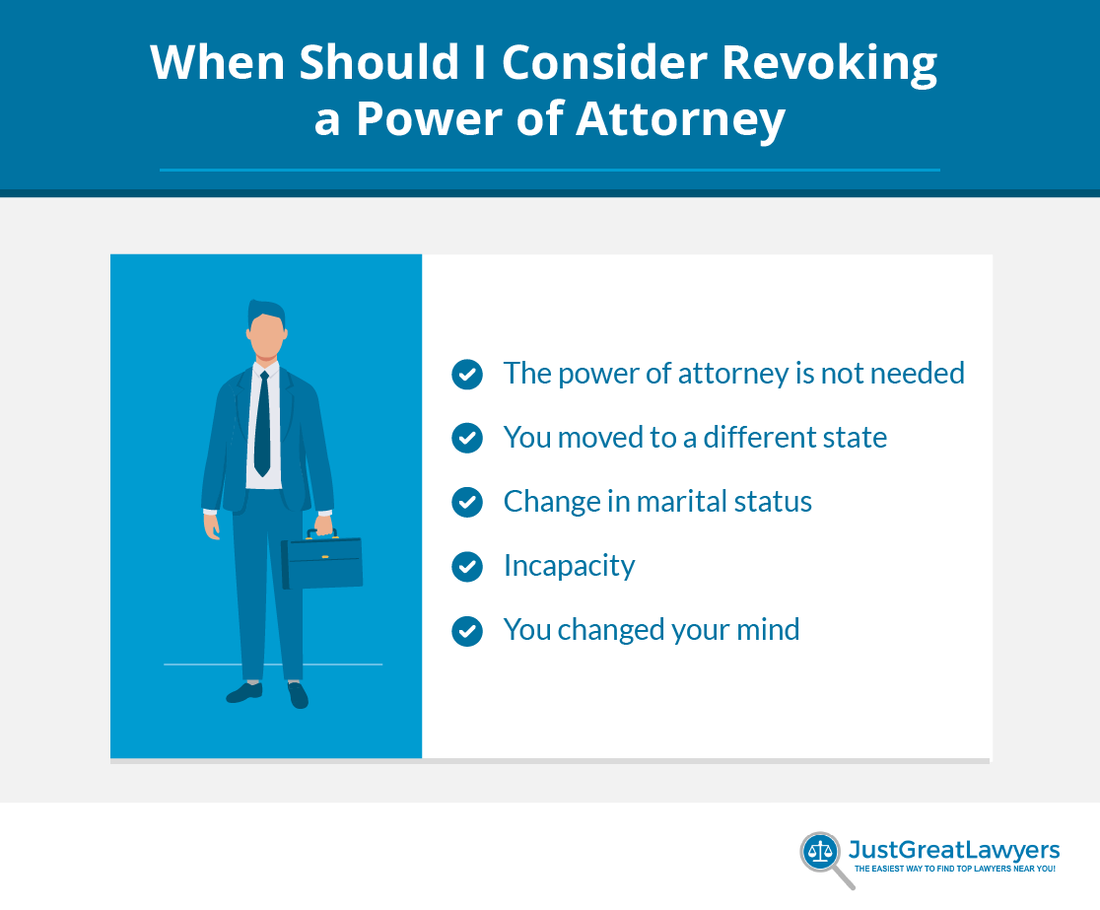
You can create a power of attorney, and you can also withdraw it.
You might want to do so if you don’t agree with the decisions your power of attorney is making or simply because you believe that your power of attorney is no longer a good fit for the role.
There are three ways to revoke a power of attorney: by preparing a written revocation letter; by destroying all existing copies of your power of attorney; and by creating a new power of attorney document that supersedes the old one.
A letter of revocation is a written document that states that you are revoking the power of attorney created on a certain date. It’s also called a “Notice of Revocation.” Most states require that you submit a written notice of revocation to the person you’ve chosen as your agent if you want to terminate a power of attorney. Check the laws of your state to see what they require.
If you decide to prepare a letter of revocation, here are the steps you will want to take:
Sign the revocation in front of a notary public
To make the revocation valid, it must be witnessed by a notary public. Notaries are government-appointed officers charged with certifying documents. They confirm the identity of the person signing the papers and verify that the person understands the documents and that they’re being signed in good faith. Documents witnessed by a notary are signed under oath to ensure their veracity.
Distribute copies of the Notice of Revocation
Once you get your revocation notarized, give a copy of it to the person who had the power of attorney, as well as to the county clerk. Also, be sure to provide a copy of the revocation to any institutions or agencies that had a copy of the previous power of attorney. These might include financial institutions, real estate agents, landlords, doctors, the IRS, family members, loved ones, and anyone else who might be affected.
This option only works if you never handed your original power of attorney to anyone or never told your agent. You can simply shred your POA and toss it away.
You can transfer the power of attorney to someone else by preparing a new one stating that all prior powers of attorney have been revoked. Under these circumstances, the old power of attorney would no longer be valid, and the new power of attorney would supersede the original POA.
 Situations change. There are several reasons you might want to revoke a power of attorney that you had previously granted. Here are a few of them:
Situations change. There are several reasons you might want to revoke a power of attorney that you had previously granted. Here are a few of them:
As previously mentioned, a power of attorney can be temporary or suited to specific situations. If those situations no longer apply, the POA may no longer be needed.
If you’ve been in the hospital and recovered, and no longer believe you need an agent to act on your behalf, that would be one reason you might revoke a power of attorney. Or if the power of attorney was for a single action, such as selling a home, it would no longer be necessary after that action had been completed.
It typically isn’t necessary to sign a new power of attorney if you have moved to a new state, but that state might have slightly different laws that should be reflected in your POA. To be sure it’s accepted and interpreted as intended, it’s recommended that you fill out a new power of attorney after you move, even if it isn’t technically required.
If you’ve recently gotten married or gone through a divorce, you may want to change your power of attorney to reflect your new marital status. If you’ve invested a spouse with a power of attorney and are no longer married to that person, you may no longer want your ex to have a say over your finances or medical care in the future. The best way to ensure that is to revoke any power of attorney you had given that person.
It’s also possible that the person you entrusted with a power of attorney is no longer fit to act on your behalf and perform the duties required of them. This may be due to mental or physical barriers, or because they have shown themselves to be untrustworthy or negligent.
When it comes right down to it, though, you don’t have to provide a reason. You were the one who had the original power of attorney drawn up as a legal tool for you to use; it’s not an obligation to anyone else. You are therefore within your rights to revoke it or transfer it for whatever reason you choose.
Of course, your agent may also change his or her mind. In such a case, when your agent is no longer interested in performing the duties associated with the power of attorney, it would be wise to release them from that obligation.
The answer is no. There is no legal requirement that a lawyer must prepare or approve a power of attorney.
However, it can be helpful to consult with a lawyer before signing any legal document to ensure that it fulfills the function you intend it to perform. You will want to be sure you are assigning the powers you intend to assign, within the parameters you intend to set forth.
After you make a POA, you can revoke it at any time, as long as you are of sound mind and physically able to do so. Only you or someone appointed to act for you can revoke it.
An ordinary power of attorney becomes invalid if the attorney-in-fact (the person appointed) becomes incompetent. But a durable power of attorney — one that gives your agent broad powers to act on your behalf when you are incapacitated — remains in effect unless you revoke it. That’s why it’s important to be sure your agent will act according to your wishes when you grant that power.
Forms that you can fill out to revoke a power of attorney are available online for each state. Reach out to us with any questions or concerns you may have about filling one out.
